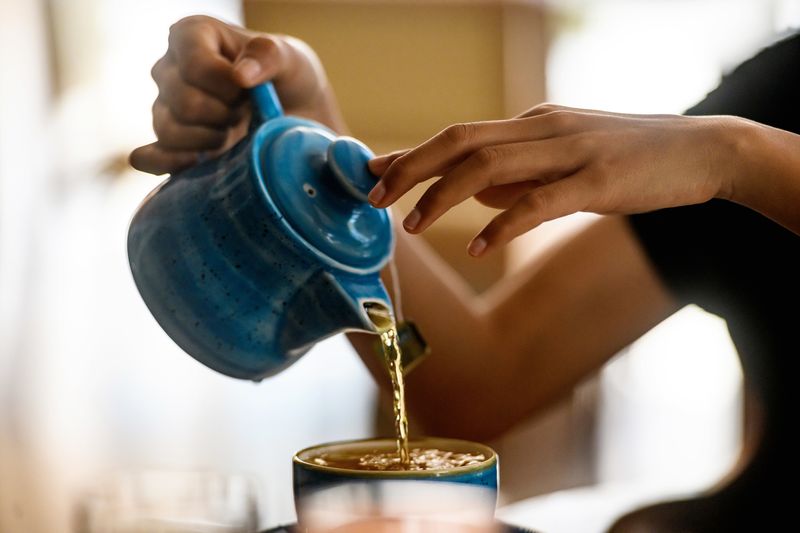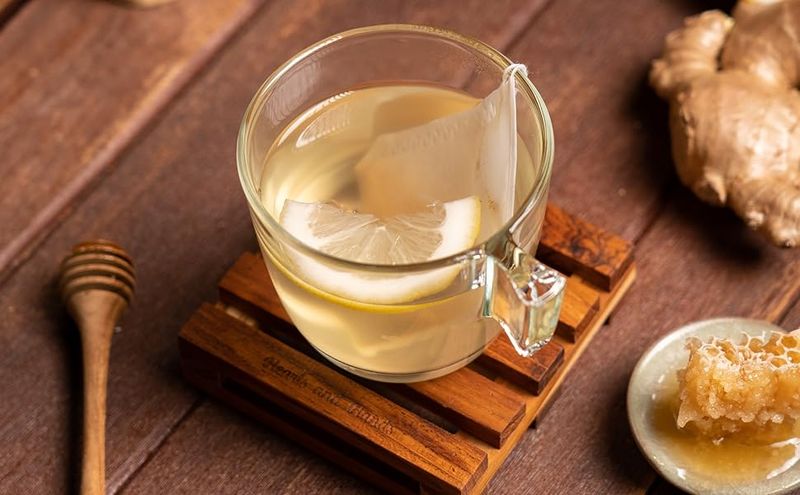A steamy mug clutched between your palms can be more than just a comforting ritual—it can be a powerful, evidence-backed remedy for one of the most persistent threats to your long-term health: chronic inflammation. Often dubbed the “silent killer,” low-grade, ongoing inflammation plays a key role in some of today’s most serious diseases, from heart conditions and diabetes to arthritis and autoimmune disorders. And while there’s no shortage of medications on the market promising relief, more and more people are looking for natural, gentler ways to soothe inflammation without side effects. That’s where this simple, spicy tea steps in.
While green and black teas tend to dominate headlines for their health benefits, there’s another unsung hero dietitians are raving about—one that delivers a bold flavor and serious anti-inflammatory power. Registered dietitians now widely point to this aromatic tea as a daily go-to for anyone looking to reduce swelling, calm the digestive system, or even ease joint pain. What makes it so powerful? This tea is brimming with potent bioactive compounds that help the body fight off oxidative stress and inflammation at the cellular level.
It’s caffeine-free, takes just minutes to brew, and costs mere cents per cup—making it one of the most affordable health upgrades around. Best of all, its warm, slightly spicy flavor feels like a cozy hug with every sip. If you’re tired of popping painkillers or just looking for a more holistic approach to wellness, read on. You might be surprised by how easily this one tea can become your daily inflammation-fighting ritual.
Inflammation: The Hidden Spark Behind Today’s Biggest Health Threats
Inflammation isn’t always bad. The classic redness and puffiness that frame a paper cut or bug bite signal your immune system rushing in for repairs, and that short-lived response—called acute inflammation—resolves once the danger fades. Chronic inflammation, however, is like an indoor ember that refuses to die out, quietly damaging tissues and setting the stage for lifestyle diseases that now dominate global mortality statistics. Cardiologists link smoldering inflammation to plaque buildup and heart attacks, endocrinologists tie it to insulin resistance and type 2 diabetes, and researchers even connect low-grade inflammation to certain cancers, neurodegenerative conditions, and stubborn weight gain.
Stress, sleep deprivation, air pollution, ultra-processed diets, and excess body fat can all pour fuel onto the fire. Because no single pill snuffs out every inflammatory pathway, experts emphasize a “stacked” approach: stress management, restorative sleep, regular movement, and—crucially—an eating pattern packed with anti-inflammatory foods and drinks. That’s where a simple cup of ginger tea can pull more weight than its humble appearance suggests.
The Anti-Inflammatory MVP You Can Brew in Minutes
Botanically speaking, ginger is a knobby underground stem called a rhizome, not a root—though it behaves like one in the kitchen. Slice it open and you release an orchestra of volatile oils responsible for that nose-tingling aroma and signature heat. Chief among them is gingerol, the same compound that gives chili peppers their punchy cousin capsaicin. When ginger is dried or gently heated, gingerol converts to shogaol, which some lab tests suggest may be even more potent at dampening inflammatory signals.
Together, these molecules appear to interrupt several cellular “alarm bells,” including nuclear factor kappa-B (NF-κB) and cyclooxygenase-2 (COX-2), both prime drivers of swelling and pain. Small human trials have found that daily ginger intake can ease arthritic knee pain, calm irritable-bowel flare-ups, and reduce exercise-induced muscle soreness. Other studies report modest drops in C-reactive protein—a common blood marker of inflammation—along with improvements in blood sugar, cholesterol, and visceral fat, three risk factors that fan the inflammatory flame.
The exact therapeutic dose is still under debate, but most dietitians agree that sipping two to three cups of ginger tea a day is safe for the general population and unlikely to clash with medications. Because ginger tea is naturally caffeine-free, you can enjoy it morning, noon, or night without sabotaging sleep—a critical but often overlooked anti-inflammatory weapon.
Steep, Blend, Chill: Simple Ways to Make Ginger Tea Your Daily Ritual
Making ginger tea is blissfully low-tech. For a classic cup, slice a thumb-sized piece of fresh ginger, drop it into a small saucepan with 1½ cups of water, and simmer for 10 to 15 minutes. Strain, squeeze in a wedge of lemon, and optionally swirl in a drizzle of honey or maple syrup. Prefer convenience? Bagged or loose-leaf ginger teas steep perfectly in 200 °F water for three to five minutes.
To beat the heat, cool the brew in the fridge and pour it over ice with a splash of orange juice for a mocktail-style refresher. Ginger tea is also a stealthy smoothie booster: replace part of your usual liquid with chilled ginger tea, toss in mango or pineapple, and let the zing balance the sweetness. Feeling congested? Add a teaspoon of grated ginger and a pinch of cayenne for a sinus-clearing steam session. Craving dessert? Warm ginger tea pairs beautifully with dark chocolate and citrus-based treats, turning an ordinary snack into a functional-food moment.
Because every sip counts toward your daily hydration goal, substituting sugar-sweetened beverages with ginger tea may indirectly curb inflammation by cutting added sugars. Start with one cup today, pay attention to how energized—and less achy—you feel, and scale up as desired. Ginger is considered safe for most people, but certain situations call for moderation. Anyone on blood-thinning medications, living with gallstones, or in late-stage pregnancy should check with a clinician first. Clinical studies rarely exceed 4 grams of ginger daily—about four strong mugs of tea—so treat that as an upper limit. As with any wellness habit, listen to your body, adjust your pour accordingly, and team your tea with a colorful, produce-forward plate.
When a tiny rhizome can deliver comfort, flavor, and scientifically backed relief, embracing the ritual feels like the easiest wellness win on the menu.


Leave a comment